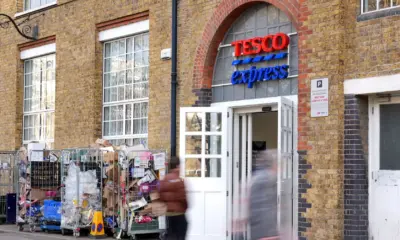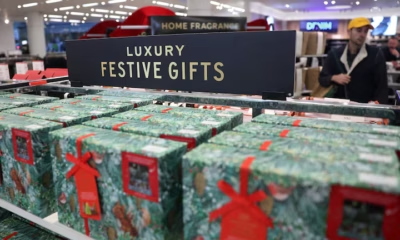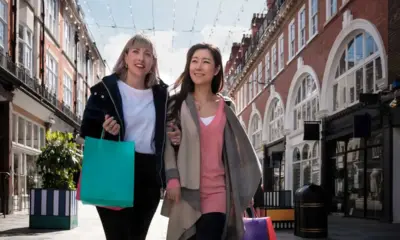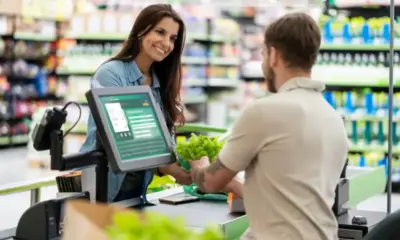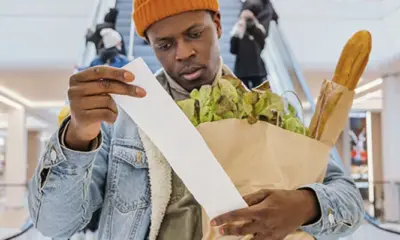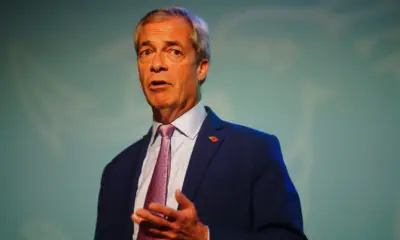Tech
Tesco Self-Checkouts Now Offer “Pay in Likes” Option

Groceries priced in clout, not pounds.
By Priya Malhotra – Urban Finance Reporter
From Cash to Clout
Tesco self-checkouts have long been the battleground between shoppers and machines that insist, “Unexpected item in bagging area.” But according to viral rumours, Britain’s biggest supermarket chain has added a bizarre new feature: customers can now pay for groceries with social media likes instead of money.
Screenshots shared online allegedly showed self-checkout screens flashing “Pay with Clout Wallet?” followed by prompts to connect to Instagram or TikTok. One TikTok clip went viral showing a shopper buying bread and milk while the machine announced, “Transaction approved. 200 likes deducted.”
Shopper Chaos
Videos flooded social feeds. One showed a student scanning pasta, then shouting, “I can’t afford this without a trending reel!” Another featured a mum paying for nappies only after her cat video gained enough traction overnight.
Some shoppers treated the rumour like performance art. A man filmed himself doing TikTok dances by the checkout, captioned: “Proof of purchase, Proof of cringe.”
By the weekend, hashtags like #TescoLikes and #PayInClout were trending across London.
Fake or Real?
As always, opinions split. Instagram polls revealed 53 percent thought the rumour was true. “Makes sense,” one voter commented. “Likes already mean more than money.” Another wrote, “Fake, but believable. Tesco would do anything for engagement.”
The plausibility was enough to push the rumour into London’s meme economy, where shoppers debated whether to bring bank cards or ring lights.
Meme Avalanche
Memes piled up faster than coins in a trolley. One edit showed receipts printed with hashtags instead of prices. Another depicted a Tesco Clubcard replaced with a glowing “Influencer Badge.”
Parody adverts spread across Twitter:
- “Clubcard Plus now includes TikTok Premium.”
- “Every like counts as one loyalty point.”
- “Scan, bag, go viral.”
Camden Market stalls quickly capitalised, selling shirts that read “I paid for eggs with likes.”
Top Comments from the Internet
- “Finally, my memes can cover dinner.”
- “Rent is next, please.”
- “At least the machines crash less than my wallet.”
Tesco’s Non-Response
Tesco officially denied nothing, offering only silence. That gap gave parody accounts room to play. A fake press release circulated, reading: “We believe groceries should reflect your online influence. Shop smarter, scroll harder.”
By Sunday, fake posters appeared in Shoreditch stores featuring influencers posing with baskets under glowing hashtags.
Why It Resonates
The rumour resonates because social media already drives consumer choices. People share grocery hauls, post recipes, and chase clout through lifestyle content. Turning that into literal payment exaggerates reality into perfect satire.
An LSE marketing professor explained, “Likes already operate as currency in modern culture. Satirising them as Tesco payment systems is both funny and frightening.” The quote itself became a trending meme.
Satirical Vision of the Future
Imagine Britain fully clout-powered. Sainsbury’s is launching “Retweet Rewards.” Aldi is offering discounts for viral TikToks of middle-aisle finds. Even Greggs sausage rolls are priced in followers, not pounds.
A parody TikTok already circulates showing a cashier shouting, “Declined, you’re shadowbanned!” as a shopper collapses in despair.
Shopper Reactions
For everyday Londoners, the rumour felt simultaneously absurd and relatable. One student quipped, “I can’t pay for rent, but at least I can buy crisps with memes.” Another joked, “My oat milk just cost a duet with a dancing pensioner.”
By Monday morning, memes showed self-checkout machines demanding selfies before releasing receipts. The caption: “Smile to survive.”
The Bigger Picture
Beneath the humour lies commentary on modern capitalism. Likes and followers already function as a form of social currency, shaping careers, relationships, and even self-worth. Applying them to groceries mocks how attention is relentlessly monetised.
Cultural critics argue that Tesco’s meme rumour works because it highlights Britain’s obsession with both cheap deals and viral fame. For many, the joke is less about payment systems and more about society’s priorities.
Conclusion
Whether Tesco truly allows shoppers to pay in likes is irrelevant. The rumour has already gone viral, cementing itself in Britain’s cultural imagination. For some, it’s hilarious satire. For others, it’s a scarily accurate metaphor for the future of consumerism.
So the next time you head to Tesco, don’t just bring your Clubcard. Bring your followers too. Because in 2025, groceries might cost clout.
By Priya Malhotra – Urban Finance Reporter
priya.malhotra@londonews.com

